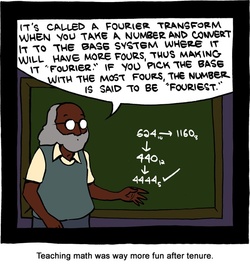Fourier base - not as you know it!
 A natural number
is called
foury
if there exsits a natural number
such that in base
all the digits of
are fours, e.g.
is foury and so is
as
. Clearly, if
is foury then
. There exists a smallest foury number
such that for all
if
then
is foury.
A natural number
is called
foury
if there exsits a natural number
such that in base
all the digits of
are fours, e.g.
is foury and so is
as
. Clearly, if
is foury then
. There exists a smallest foury number
such that for all
if
then
is foury.
A natural number is called unfoury if in any natural base , none of the digits of is four. E.g. is unfoury. There exists a largest unfoury number .
Find and . Your answer will be of the form (with a decimal point between them). E.g. if you think that and then you should enter .
Image credit: http://popperfont.net/tag/science-careers/
The answer is 24.8.
This section requires Javascript.
You are seeing this because something didn't load right. We suggest you, (a) try
refreshing the page, (b) enabling javascript if it is disabled on your browser and,
finally, (c)
loading the
non-javascript version of this page
. We're sorry about the hassle.
Suppose that N is foury. Then there exists a natural number b ≥ 5 (otherwise 4 is not a digit in base b ) such that N = 4 4 . . . 4 b ( k digits, all equal to 4 ), i.e.: N = i = 0 ∑ k − 1 4 b i = 4 i = 0 ∑ k − 1 b i = 4 b − 1 b k − 1 So, for k = 1 we have N = 4 . The next foury number will be for b = 5 and k = 2 , i.e. N = 4 ⋅ 6 = 2 4 . So there are no foury numbers in between.
Now let n ≥ 2 4 such that n ≡ 0 ( m o d 4 ) . Then n = 4 m for m ≥ 6 . Let b = m − 1 and k = 2 . Then 4 b − 1 b 2 − 1 = 4 ( b + 1 ) = 4 m = n , i.e. n = 4 4 b is foury.
So N = 2 4 .
As to the second part, for any number k ≥ 9 we have k = 1 4 k − 4 , so there are no unfoury numbers > 8 . On the other hand, 8 = 1 0 8 = 1 1 7 = 1 2 6 = 1 3 5 is unfoury, as for b < 5 , 4 is not a digit. Hence M = 8 .
So the answer is N . M = 2 4 . 8